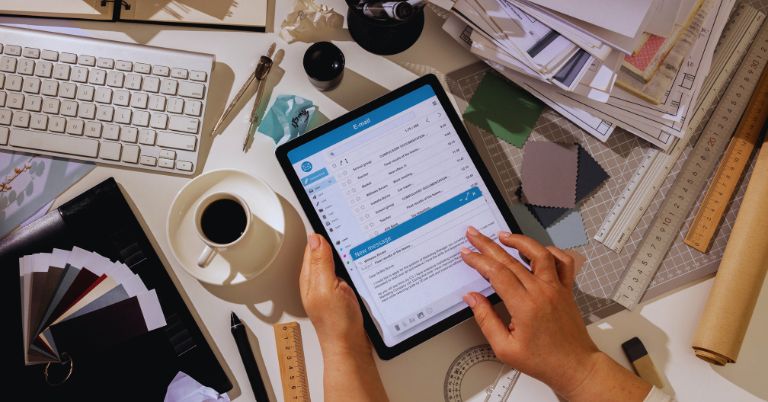To manage multiple projects effectively, prioritize tasks and deadlines, establish clear communication channels, and utilize project management tools. It’s crucial to stay organized and delegate tasks to avoid feeling overwhelmed.
Proactive planning, regular check-ins, and adaptable strategies will help ensure successful project completion. By implementing these strategies, you can stay on top of multiple projects while ensuring efficient collaboration and meeting project goals.
Let's See the Topic Overview
The Benefits Of Multitasking With Multiple Projects
How Multitasking Can Increase Productivity
Multitasking, the ability to manage multiple projects simultaneously, has become a crucial skill in today’s fast-paced work environment. While some may argue that focusing on one project at a time is more efficient, there are several benefits to multitasking that can actually increase productivity.
Here are some key points to consider:
- Enhanced task-switching ability: Being able to seamlessly switch between tasks is a skill that comes with multitasking. By developing this skill, you can effectively allocate your time and attention to different projects based on their priority or urgency, ultimately increasing your productivity.
- Efficient use of time: Multitasking allows you to make the most of your available time. Instead of waiting for certain projects to be completed before moving on to the next, you can make progress on several tasks simultaneously. This means less time wasted and more projects completed within the given timeframe.
- Increased adaptability: Multitasking enables you to adapt to changing priorities or unexpected circumstances more efficiently. You can quickly shift your focus from one project to another, ensuring that progress is not hindered by unforeseen events.
- Improved creativity: Engaging with multiple projects simultaneously can stimulate creativity and enhance problem-solving skills. Seeing different perspectives and working on diverse projects keeps your mind active and encourages innovative ideas.
- Greater learning opportunities: Managing multiple projects allows you to gain exposure to various areas of expertise. Each project presents unique challenges and learning opportunities that can broaden your skillset and knowledge base.
With the ever-increasing demands of the modern work environment, multitasking has become a valuable asset. By effectively juggling multiple projects, you can not only increase your productivity but also enhance your adaptability, creativity, and overall professional growth. So why limit yourself to working on one project at a time when you can accomplish so much more through multitasking?
Embrace the benefits and make the most of your time and abilities.
Strategies For Effective Multitasking
Managing multiple projects can be a challenging task, but with the right strategies in place, you can ensure efficiency and productivity. Here are some effective strategies for multitasking:

Prioritizing Tasks For Maximum Efficiency
- Evaluate the importance and urgency of each task before diving in.
- Determine which tasks are critical to the success of your projects.
- Break down your projects into smaller, manageable tasks.
- Rank your tasks based on their priority level.
- Begin with the most important and time-sensitive tasks.
- Allocate specific time slots for each task to keep yourself on track.
- Regularly reassess your priorities as new tasks come in.
Setting Realistic Goals And Deadlines
- Clearly define the objectives for each project.
- Break down your goals into specific, measurable, achievable, relevant, and time-bound (smart) targets.
- Set realistic deadlines that allow for unforeseen setbacks.
- Consider the dependencies and interdependencies of tasks when setting deadlines.
- Avoid over-committing by taking into account your available resources and capabilities.
- Communicate your goals and deadlines to your team members, if applicable.
- Regularly review and update your goals and deadlines as needed.
Utilizing Project Management Tools To Stay Organized
- Use project management software or tools to keep track of tasks, deadlines, and progress.
- Create a centralized system where you can store all project-related information.
- Utilize features such as task assignment, calendar integration, and progress tracking.
- Collaborate with team members by using shared project management tools.
- Leverage the power of automation to streamline repetitive tasks.
- Regularly update your project management tool to reflect the latest status.
- Take advantage of reminders and notifications to stay on top of your tasks.
Remember, effective multitasking requires focus, proper planning, and organization. By prioritizing tasks, setting realistic goals and deadlines, and utilizing project management tools, you can successfully manage multiple projects and achieve optimal results.
Overcoming Challenges In Multitasking
Managing multiple projects can be a demanding task, requiring effective strategies to overcome various challenges. Two key aspects to consider when juggling multiple projects are dealing with distractions maintaining focus, and managing time effectively. In addition to these, it is vital to avoid burnout and maintain a healthy work-life balance.
Let’s dive into each of these areas in more detail:
Dealing With Distractions And Maintaining Focus
With numerous projects vying for your attention, it can be challenging to stay focused. Here are some strategies to overcome distractions and maintain your productivity:
- Establish a dedicated workspace: Create a designated area free from distractions, such as noise or interruptions, to facilitate concentration and focus.
- Minimize digital interruptions: Turn off notifications on your devices or use digital tools that temporarily block distracting websites or apps during work periods.
- Prioritize tasks: Develop a clear list of priorities for each project, allowing you to concentrate on the most significant tasks first.
- Practice time blocking: Allocate specific time blocks for each project, ensuring that you give your undivided attention to each one without interruptions.
- Employ time management techniques: Techniques such as the Pomodoro technique or the Eisenhower matrix can help increase focus and productivity by breaking tasks into manageable chunks or prioritizing tasks based on importance and urgency.
Managing Time Effectively When Juggling Multiple Projects
Efficient time management is crucial when working on multiple projects concurrently. Here are some tips to help you make the most of your time:
- Set realistic deadlines: Take into account the complexity and scope of each project, allowing ample time to complete tasks without feeling overwhelmed.
- Utilize project management tools: Implement tools such as Trello, Asana, or monday.com to organize and track the progress of your projects, ensuring nothing slips through the cracks.
- Delegate responsibilities when possible: If you have a team, consider assigning tasks to individuals who can handle them efficiently, allowing you to focus on other crucial aspects.
- Break projects into smaller tasks: By breaking projects into smaller, manageable tasks, you can allocate time more effectively and have a clear overview of your progress.
- Regularly reassess priorities: As projects evolve, certain tasks may become more urgent or critical. Regularly review and adjust your prioritization to ensure you stay on track and meet deadlines.
Avoiding Burnout And Maintaining Work-Life Balance
When managing multiple projects, it’s important to avoid burnout and maintain a healthy work-life balance. Consider the following tips to achieve this:
- Take regular breaks: Allow yourself short breaks to recharge and refocus throughout the day, helping to prevent mental fatigue and enhance overall productivity.
- Practice self-care: Engage in activities that bring you joy and relaxation outside of work, such as exercising, reading, or spending time with loved ones.
- Establish boundaries: Set clear boundaries between work and personal life, ensuring that you have time to unwind and engage in non-work-related activities.
- Learn to say no: Avoid taking on additional projects or tasks that may overload you. Prioritize your existing commitments and only take on what you can handle effectively.
- Seek support: Reach out to colleagues, friends, or mentors for guidance and support when feeling overwhelmed. Sometimes, sharing the load or seeking advice can alleviate stress and provide clarity.
By implementing these strategies, you can effectively overcome the challenges associated with multitasking and manage multiple projects with confidence and success. Remember to tailor these approaches to your personal preferences and find what works best for you.
Developing Effective Time Management Skills
Managing multiple projects can be a challenge, especially when it comes to effectively managing your time. Developing strong time management skills is crucial to ensure that you stay organized, meet deadlines, and maintain productivity. Here are some effective strategies to help you manage multiple projects successfully.
Creating A Daily Schedule And Sticking To It
- Start each day by creating a detailed schedule that outlines your tasks and priorities for the day, allocating specific time slots for each project.
- Prioritize your projects based on urgency, importance, or deadlines to ensure that you tackle the most critical tasks first.
- Break down larger projects into smaller, manageable tasks and allocate time for each task in your schedule.
- Set realistic deadlines for each task and ensure that you allocate sufficient time for unexpected issues or delays.
- Avoid multitasking and focus on one task at a time to maximize productivity and avoid distractions.
Implementing The Pomodoro Technique For Increased Focus
- The Pomodoro technique is a time management method that helps improve focus and productivity. It involves breaking your work into 25-minute intervals called “Pomodoros” with short breaks in between.
- Set a timer for 25 minutes and work on a specific task during that time. Once the timer goes off, take a short 5-minute break to relax and recharge before starting the next Pomodoro.
- After completing four Pomodoros, take a longer break of around 15-30 minutes to rest and rejuvenate.
- The Pomodoro technique helps maintain focus, prevents burnout, and improves time management by encouraging regular breaks and structured work intervals.
Using Time-Blocking To Allocate Specific Time Slots For Each Project
- Time-blocking is a technique where you allocate dedicated time slots for each project or task on your calendar.
- Start by analyzing the time required for each project, considering its complexity and deliverables. Then, allocate specific time blocks accordingly.
- By blocking specific time slots for each project, you can ensure that you give sufficient attention and focus to each task without neglecting others.
- Avoid overloading yourself with too many projects at once. Be realistic and allocate an appropriate amount of time for each project to maintain a balance.
- Stick to your time blocks and avoid getting distracted by unrelated tasks or interruptions during those dedicated periods.
Managing multiple projects can be overwhelming, but with effective time management skills, you can handle them with ease. By creating a daily schedule, implementing the Pomodoro technique, and using time-blocking, you’ll be able to stay organized, maintain focus, and accomplish your goals more efficiently.
Remember, mastering time management is key to successfully managing multiple projects simultaneously.
Enhancing Productivity Through Task Delegation
Managing multiple projects can be a balancing act, and one way to maximize productivity is through effective task delegation. By identifying tasks that can be delegated to others, communicating and collaborating effectively with team members, and empowering them to take ownership of their responsibilities, you can streamline your workflow and achieve better results.
Let’s explore each of these strategies in detail.
Identifying Tasks That Can Be Delegated To Others
Delegating tasks is not only a time-saving measure but also a way to leverage the skills and strengths of your team members. Here are some key points to consider when identifying tasks that can be delegated:
- Assess the complexity and skill level required for each task: Determine which tasks can be handled by team members based on their expertise and abilities.
- Consider the workload and priorities: Delegate tasks that align with each team member’s workload and prioritize those that require immediate attention.
- Evaluate the efficiency and effectiveness of delegation: Regularly review the outcomes of delegated tasks to ensure that they are completed satisfactorily and within the given timeframe.
Effective Communication And Collaboration With Team Members
Communication is vital when managing multiple projects. Here are some ways to enhance communication and collaboration within your team:
- Clearly define expectations: Provide clear instructions, deadlines, and desired outcomes for each delegated task to avoid any confusion.
- Foster an open and supportive environment: Encourage team members to ask questions, share ideas, and provide feedback to facilitate effective collaboration.
- Utilize collaborative tools: Take advantage of project management and communication software to facilitate seamless collaboration, such as task management tools, team chat platforms, or shared document repositories.
Empowering Team Members To Take Ownership Of Their Responsibilities
Empowering your team members to take ownership of their responsibilities can lead to increased productivity and satisfaction. Consider the following points:
- Assign tasks based on skills and interests: Allocate tasks that align with each team member’s skills and interests to foster a sense of ownership and motivation.
- Provide autonomy and responsibility: Delegate authority to team members, allowing them to make decisions within their delegated tasks, and encourage them to take initiative.
- Offer support and feedback: Regularly check in with team members to offer support, guidance, and constructive feedback to ensure their success in fulfilling their delegated responsibilities.
By leveraging the strengths of your team members, communicating effectively, and empowering them to take ownership, you can enhance productivity and manage multiple projects more efficiently. Delegating tasks not only relieves you of excessive workload but also cultivates a sense of teamwork and professional growth within your team.
Tips For Maintaining Focus And Concentration
Maintaining focus and concentration while managing multiple projects can be a challenging task. With numerous tasks and deadlines to juggle, it’s easy to feel overwhelmed and lose track of your priorities. However, with a few helpful strategies, you can stay on top of your work and ensure each project receives the attention it deserves.

Here are some tips to help you maintain focus and concentration:
Eliminating Unnecessary Distractions In Your Workspace
- Clear your workspace: Ensure your work area is clutter-free and organized. A clean and tidy workspace helps create a conducive environment for focus and concentration.
- Minimize digital distractions: Turn off notifications on your phone and computer to prevent interruptions. Consider using website blockers or time trackers to limit access to distracting websites or apps during designated work periods.
- Set boundaries: Communicate with colleagues and team members about your availability and establish clear boundaries to minimize interruptions. Set specific times for checking emails or attending meetings to maintain uninterrupted focus on your projects.
- Create a dedicated work environment: If possible, designate a separate space solely for work-related activities. This can mentally prepare you for focused work and help separate work from personal life.
Practicing Mindfulness And Meditation Techniques
- Take regular breaks: Incorporate short breaks throughout the day to recharge your mind and prevent burnout. Use these breaks to practice mindfulness techniques like deep breathing or stretching exercises to refocus your energy.
- Meditate before or after work: Start or end your workday with a short meditation session. Even five minutes of meditation can help calm your mind, enhance focus, and increase mental clarity.
- Practice daily mindfulness: Stay present and attentive by practicing mindfulness in your everyday activities. Engage fully in each task by giving it your complete attention, eliminating distractions, and focusing on the task at hand.
Breaking Tasks Down Into Smaller, Manageable Chunks
- Prioritize your projects: Assess the importance and urgency of each project and rank them accordingly. This helps you allocate your time and energy effectively.
- Create a project roadmap: Divide each project into smaller, manageable tasks with clear deadlines. Breaking tasks down into smaller chunks makes them more approachable and less overwhelming.
- Use a task management system: Utilize project management tools or software to help you track and visualize your progress. This keeps you organized and motivated as you accomplish smaller tasks.
- Celebrate milestones: Recognize and celebrate your achievements as you complete each task or reach significant project milestones. This boosts motivation and maintains focus throughout the entire project.
By implementing these tips, you can enhance your ability to manage multiple projects effectively. Remember, maintaining focus and concentration is crucial for productivity and successful project completion.
The Importance Of Self-Care In Multitasking
Managing multiple projects can be overwhelming, but incorporating self-care practices into your routine can help you stay balanced and productive. Taking regular breaks practicing self-care activities, finding time for physical exercise and mental relaxation, and balancing work and personal life are essential strategies to prevent burnout and ensure your success in multitasking.
Taking Regular Breaks And Practicing Self-Care Activities
- Breaks are not a waste of time; they are necessary for maintaining focus and productivity.
- Engage in activities that help you relax and rejuvenate, such as deep breathing or meditating.
- Take short breaks throughout the day, stepping away from your workspace to clear your mind.
- Give yourself time to engage in hobbies or activities that bring you joy, such as reading, painting, or listening to music.
- Prioritize self-care activities like getting enough sleep, eating nutritious meals, and staying hydrated.
Finding Time For Physical Exercise And Mental Relaxation
- Physical exercise is key to combating stress and boosting your energy levels.
- Incorporate exercise into your daily routine, whether it’s a quick walk, yoga session, or workout video.
- Mental relaxation techniques, such as mindfulness or journaling, can help clear your mind and enhance your focus.
- Explore different relaxation methods and find what works best for you, whether it’s taking a warm bath, practicing deep breathing exercises, or listening to calming music.
- Schedule regular exercise and relaxation time in your calendar to ensure you make time for it.
Balancing Work And Personal Life To Avoid Burnout
- Set boundaries between work and personal life to avoid constant overlap.
- Create a clear separation between your workspace and living space, even if you work from home.
- Delegate tasks when possible, both at work and in your personal life.
- Prioritize your most important projects and tasks to avoid overwhelming yourself with too much at once.
- Learn to say no when necessary to protect your time and well-being.
Remember, self-care is not a luxury; it is a vital aspect of managing multiple projects effectively. By taking care of your physical and mental well-being, you will be better equipped to handle the demands of multitasking and achieve success without burning out.
So, make self-care a priority and benefit from increased productivity, improved focus, and overall well-being.
Strategies For Improving Efficiency With Multitasking
Managing multiple projects simultaneously requires effective strategies to ensure efficiency and productivity. By streamlining processes, automating repetitive tasks, and leveraging technology, project managers can optimize their multitasking abilities. Let’s explore these strategies in detail:
Streamlining Processes And Eliminating Redundancies
- Identify and prioritize project tasks: Break down each project into smaller tasks and determine their significance to prioritize accordingly.
- Delegate responsibilities: Assign specific tasks to team members based on their skills and expertise to streamline the workflow and ensure efficient completion.
- Establish clear communication channels: Foster effective communication within the team to minimize misunderstandings, delays, and redundant work.
- Set realistic deadlines: Define achievable deadlines for each task, considering the overall project timeline and the availability of resources.
- Regularly review and update project plans: Monitor the progress of each project and adjust plans accordingly to eliminate redundancies and optimize resources.
Automating Repetitive Tasks For Increased Efficiency
- Identify repetitive tasks: Analyze the projects and identify any tasks that occur frequently and can be automated.
- Research and implement automation tools: Explore various project management software or tools that can automate repetitive tasks, such as scheduling meetings or generating reports.
- Train team members: Provide training on utilizing automation tools effectively, which will save time and effort by streamlining routine tasks.
- Regularly evaluate automation processes: Continuously review and refine the automated processes to ensure they remain efficient and effective.
Leveraging Technology To Simplify Project Management
- Invest in project management software: Utilize online project management software to streamline collaboration, task tracking, and document sharing.
- Utilize cloud storage and file-sharing platforms: Store and share project-related files and documents on cloud platforms, enabling easy access and collaboration among team members.
- Implement real-time communication tools: Utilize instant messaging or video conferencing tools to enhance communication and reduce response times.
- Utilize project management dashboards: Use visual dashboards to monitor project progress, track milestones, and identify potential bottlenecks.
- Integrate project management tools with other systems: Integrate project management software with other relevant tools, such as time tracking or resource planning, to streamline overall project management processes.
By implementing these strategies, project managers can enhance their multitasking abilities and effectively manage multiple projects. Streamlining processes, eliminating redundancies, automating repetitive tasks, and leveraging technology contribute to increased efficiency and productivity, ensuring successful project completion.
Conclusion
Managing multiple projects can be a daunting task, but with the right strategies in place, it becomes more manageable. By prioritizing tasks, setting clear goals, and utilizing project management tools, you can effectively organize your workload and ensure that each project receives the attention it deserves.
Communication and collaboration play a vital role in successful project management, so be sure to maintain open lines of communication with your team and stakeholders. Take breaks and practice self-care to avoid burnout, as maintaining your physical and mental well-being is crucial for productivity.
Remember, flexibility is key when managing multiple projects, so be prepared to adapt and adjust as needed. With proper planning and implementation of these tips, you can conquer the challenges of managing multiple projects and achieve success in all your endeavors.












